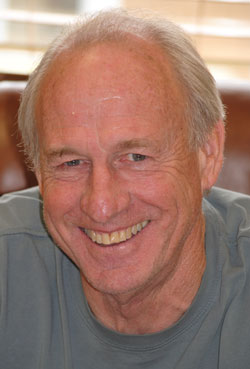Idyllwild Water District residents will have a choice of five candidates for the three director seats up for election in the August mail-in ballot election. Running for re-election are President Jim Billman and directors Warren Monroe and Dean Lattin, who is in his first election. The two challengers are Steven Kunkle and June Rockwell.
Voted ballots must be received by the election officials no later than the close of the polls on election day or be postmarked on or before election day, Aug. 25, and received no later than three days after election day to be counted.
On Wednesday, Aug. 5,. the Town Crier will hold a candidates forum for IWD voters. The forum will be from 6 to 8 p.m. at the Idyllwild Nature Center.
This week’s issue completes all of the interviews with the water district candidates. This interview is with Jim Billman. The interview with Director Monroe is on page 27. The interview with Rockwell was published in the July 16 issue of the paper and the Kunkle and Lattin interviews were in the July 23 issue.

Photo by J.P. Crumrine
Jim Billman began his life with Idyllwild in 1961 when he would visit his grandparents who owned a stable here. During the summers, he found work at Mt. San Jacinto State Park.
While he spent time employed at aerospace firms in Orange County, by the late 1980s, he eventually returned to Idyllwild working construction, which drew him to his current profession — real estate.
“If Idyllwild didn’t exist, I’d probably leave the state,” Billman said firmly.
Billman is the current Idyllwild Water District board president. He joined the board of directors in September 2005, to complete a term of a director who resigned. He was elected to his first four-year term in August 2007 and re-elected without opposition in 2011. He has been board president since January 2014.
TC: Why did you originally join the board. Why do you want to continue?
“It was a good fit with my job skills — real estate and construction,” he replied.
If re-elected, Billman added that he wants to ensure the district moves forward in completing the various projects. For example, he stressed the value of the recycling facility to the district.
TC: What is the purpose of the recycling facility?
“No sense letting the product of the wastewater treatment plant go off the Hill,” he responded. “There’s something we can do with that.”
“This could be a better project than creek water,” Billman stressed. “We’ll have more potable water by definition with recycled water.” Not only will customers have the option to buy landscaping water, at a lower cost than the basic rate, but further in the future, the district may use the water to recharge its wells.
“The benefits are for water, sewer and recycling customers. It’s a hell of an investment. Everybody benefits,” Billman explained and stated, “Three-quarters of the loan is forgiven and it’s a low-interest rate on the balance over 40 years.”
TC: With respect to revenues and water supply, what should customers expect in the next 12 months? … and the next five years?
While Billman did not make a commitment about future rates or supply, he stressed that the board is working hard. IWD is unique compared to neighboring districts because it is the only one serving businesses, schools and a large residential community.
While expenses may increase, the problems the board usually confronts are unexpected costs. For example, “Every year our fees from the county go up and State Water Resources Control Board changes its requirements,” Billman explained. “We have no idea how great the increase will be that we can expect, but we try to stay ahead of the crisis.”
While Billman would like to keep revenue on pace with the cost of living, he stressed that one bad year can wipe out net income and the water district would have to rebuild reserves, which was the reason for the 2010 increase.
“The reason rates went up 30 percent in five years since 2010 was there was no increase since 1995,” he said. “And we held off in 2013 because the economy couldn’t handle it.”
TC: How do you assess the district’s infrastructure?
“The infrastructure is coming around. We’re working on it in the older areas,” Billman acknowledged. “Service lines below ground for many years should have been addressed and will be soon.”
TC: What is your view on “will serve” letters during stages 2 & 3? Should new development be curtailed?
“Stage 2 is working in the district. Idyllwild customers have gone beyond normal conservation,” he commented. “We can’t find more ways to conserve, but our conscientious customers will figure it out on their own. They’re already doing it.”
The number of new letters is set from the guidelines on usage, according to Billman. “It’s like science. We produce X amount without any new meters.”
But the issuance of new “will-serve” letters can increase the demand on the district’s water supply and “… the increased demand might be unknown,” he stressed. This might result in lengthening Stage 2 or needing to move to Stage 3, according to him.
“Right now the wells’ status is rebuilding and we don’t have to worry,” Billman said. “If we release new meters, would the well levels hold steady? It is irresponsible to change anything about water meters. For years, there will probably be a moratorium until the reserves level can build and then still get a meter.
“I find it interesting why in bad times they try to get meters,” he opined.
Conclusion
“Water is the new gold standard,” Billman said. “[IWD’s cost of water] is a lot less than bottled water.” The reason is the board’s efforts to take actions for the good of the entire community — visitors or full-time residents, according to him.
“We haven’t taken on any bad projects, but I’d be more than happy to listen,” he concluded. “Water is quite a challenge, but a good challenge. [There’s] far more to do than most people suspect — finding it and producing it.
“It’s an imperative. When people pay for the water, they expect good water coming out of the tap when they turn it on,” added. “The board makes the decisions and the staff implements. The group in place is doing a yeoman job.”










